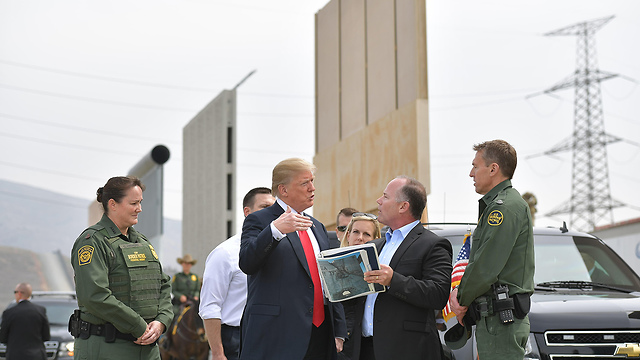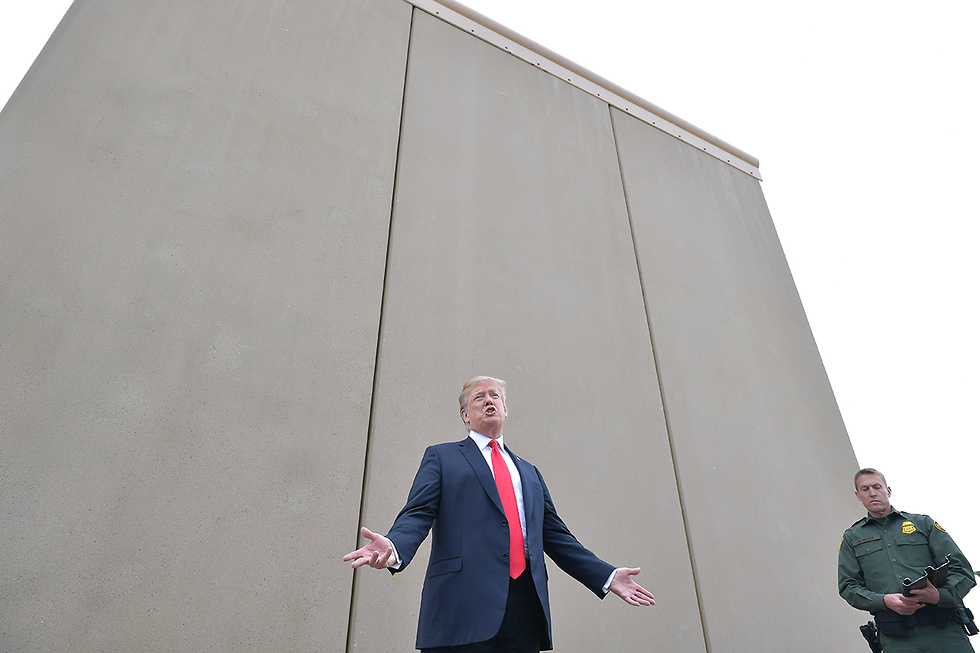

It's the drugs, stupid
Opinion: Trump’s insistence that building a wall along the Mexican border will put an end to not only illegal immigration but also to drug trafficking is baseless, seeing as that 30 years of law enforcement has only exacerbated the problem by driving up prices and empowering the cartels.
Trump's longing for the wall ostensibly stems from a desire to stop illegal immigration. The net migration to the US has actually dropped in recent years, and many economists disagree with the claim that immigration damages the economy. There is, however, no dispute over the damage the drugs do, but there is a disagreement over ways to eradicate this plague.
One positive aspect that emerged from the ongoing row over the wall is the issue of the advisability of anti-drug enforcement, and it seems as though the scales are being tipped to the side of those who want it abolished. Until now, US has refused to engage in considerations of its drug policy's economic cost-benefit, but the price of enforcement is so high and its failures are so decisive that this trend is starting to change.
Some data indicates that building a wall is simply a lack of good sense: 90 percent of the drugs brought in from abroad are smuggled in via vehicles and vessels entering the United States through its gates. Every day, 34,000 cars enter the United States from Mexico, and the authorities seize only 10 percent of the drugs that come through the border. Thorough monitoring of all the vehicles that cross the border is not possible, proving that the wall will almost certainly be ineffective.
If we look at the overall picture, we’ll see that in the past hundred years, the countries of the world has wasted close to a trillion dollars on waging a war on drugs that they have lost. The US Drug Enforcement Administration estimates that opioid abuse causes nearly $80 billion in damage to the country's economy every year. A quarter of the world's drug-related fatalities are American. The number of US citizens who die annually as a result of a drug overdose has nearly tripled over the last two decades, and in 2014 stood at some 64,000. Most of the fatal overdoses among middle-aged drug addicts were caused by synthetic heroin, which is tens of times more powerful than “regular” heroin.
Half a million Americans are currently imprisoned for drug offenses (in 1980, for instance, that number stood at just 40,000), and approximately a million people are arrested annually for drug-related crimes. Every 26 seconds someone is arrested on suspicion of possession of an illegal drug. The widespread use of drugs—including painkillers containing narcotics, especially morphine—is one of the leading reasons behind the declining life expectancy in the world's richest country.
Since drug addicts are captive customers, they are not affected by the high price of the commodity and will resort to crime in order to obtain it. The alternative provided by the market is the development of synthetic drugs. The supply is met by the demand, and opium cultivation has grown eightfold in the past ten years.
A starving farmer in the state of Guerrero in Mexico, where most of the drugs are produced, is interested in his family's financial well-being and not in a dire state of American society. Enforcement increases the price of drugs and inadvertently gives the power to drug cartels and criminal organizations that produce and traffic the illegal substances and use violence to control the market. In 2017, some 20,000 Mexicans were killed in drug wars.
The defeat in the war against drugs has encouraged calls to redirect the enormous resources currently at the disposal of law enforcement into the spheres of education, research and rehabilitation, as well as into an expansion of social services and investment in a war on obesity that has contributed greatly to the falling US life expectancy.
Since American culture influences the rest of the free world, it’s likely the drug trends will also make their way to Israel sooner rather than later. It’s advisable to take precautionary measures before it actually happens and not wait for foreign trends to show us the way.



















